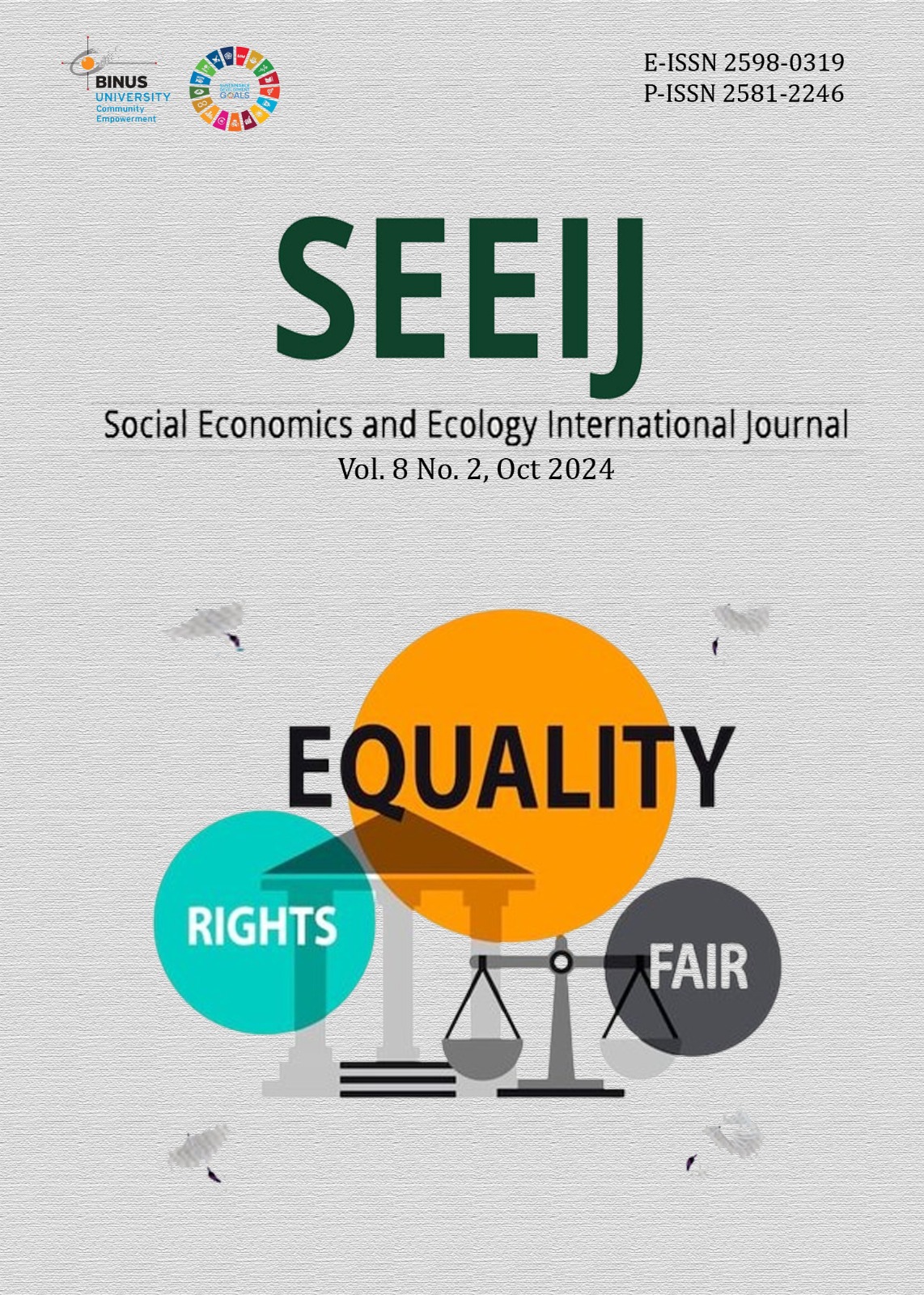Exploring Gumuruh Village's Upcycling Potential Using Creative Innovation To Turn Plastic Waste Into Commercial Products
DOI:
https://doi.org/10.21512/seeij.v8i2.12038Keywords:
Upcycling, Plastic Waste, Community Development, Design MethodAbstract
Plastic waste presents a major environmental challenge worldwide, with improper disposal endangering ecosystems. Upcycling offers a solution by conserving natural resources, reducing carbon emissions, and minimizing waste, all while lowering the demand for new production. Additionally, recycling generates significant economic benefits, particularly by producing high-quality commercial products in sectors like furniture. In Gumuruh Village, Bandung, the community actively participates in recycling efforts, including the processing of organic waste, to create sustainable products. Through the Design Thinking approach and Service Learning, academics and local SMEs collaborate to design and develop products that directly benefit the community.
References
Ani, N., Furnamasari, Y. F., & Dewi, D. A. (2022). Analisis Pendekatan Service Learning untuk Membentuk Karakter siswa dalam Pembelajaran PKn di SD. Edumaspul: Jurnal Pendidikan, 6(1), 1130–1133. https://doi.org/10.33487/edumaspul.v6i1.2507
Berliana, I. G. A. A. A., Raharja, I. G. M., & Artayasa, I. N. (2022). Proses Daur Ulang Plastik Sebagai Furnitur Yang Memenuhi Standar Ergonomi. Jurnal Ilmiah Desain & Konstruksi, 21(2), 270–279. https://doi.org/10.35760/dk.2022.v21i2.7136
Darby, A., Longmire-Avital, B., Chenault, J., & Haglund, M. (2013). Students’ Motivation in Academic Service-Learning over the Course of the Semester. College Student Journal, 47, 185–191.
Kurniasari, A. E., Swastikirana, N., Pabinti, O. S., & Noviandri, P. P. (2019). Pengolahan Limbah Plastik Sebagai Material Alternatif Akustik Ruang. SMART (Seminar on Architecture Research & Technology), 4(1), 19–30. https://smartfad.ukdw.ac.id/index.php/smart/article/view/95/77
Lake, V. E., & Jones, I. (2008). Service-learning in early childhood teacher education: Using service to put meaning back into learning. Teaching and Teacher Education, 24(8). https://doi.org/10.1016/j.tate.2008.05.003
Maitlo, G., Ali, I., Maitlo, H. A., Ali, S., Unar, I. N., Ahmad, M. B., Bhutto, D. K., Karmani, R. K., Naich, S. ur R., Sajjad, R. U., Ali, S., & Afridi, M. N. (2022). Plastic Waste Recycling, Applications, and Future Prospects for a Sustainable Environment. Sustainability (Switzerland), 14(18). https://doi.org/10.3390/su141811637
Musa, N., Ibrahim, D. H. A., Abdullah, J., Saee, S., Ramli, F., Mat, A. R., & Khiri, M. J. A. (2017). A methodology for implementation of service learning in higher education institution: A case study from faculty of computer science and information technology, UNIMAS. Journal of Telecommunication, Electronic and Computer Engineering, 9(2–10), 101–109.
Roslinda, E., Widiastuti, T., Citra, D., & ... (2022). Pemanfaatan Sampah Plastik Kemasan dan Perca Untuk Kreatifitas Ekonomis Kelompok PKK. Dinamisia: Jurnal …, 6(1), 29–37. http://journal.unilak.ac.id/index.php/dinamisia/article/view/8443%0Ahttps://journal.unilak.ac.id/index.php/dinamisia/article/download/8443/3777
Yani, I., Rosiliani, D., Khona’ah, B., & Almahdini, F. A. (2020). Identification and plastic type and classification of PET, HDPE, and PP using RGB method. IOP Conference Series: Materials Science and Engineering, 857(1). https://doi.org/10.1088/1757-899X/857/1/012015
Yosianita, A. (2022). Perancangan Storage Modular Berbahan Dasar Sampah Plastik. Ars: Jurnal Seni Rupa Dan Desain, 25(2). https://doi.org/10.24821/ars.v25i2.4756
Downloads
Published
How to Cite
Issue
Section
License
Copyright (c) 2024 Friska Amalia, Andriano Simarmata, Iftika Suliastuti, Baskoro Azis, Imanda Dea Sabiella

This work is licensed under a Creative Commons Attribution-NonCommercial 4.0 International License.
The Authors submitting a manuscript do so on the understanding that if accepted for publication, copyright of the article shall be assigned to SEEIJ Community Empowerment (CE) Bina Nusantara University as publisher of the journal.
Copyright encompasses exclusive rights to reproduce and deliver the article in all form and media, including reprints, photographs, microfilms and any other similar reproductions, as well as translations. The reproduction of any part of this journal, its storage in databases and its transmission by any form or media, such as electronic, electrostatic and mechanical copies, photocopies, recordings, magnetic media, etc., will be allowed only with a written permission from SEEIJ Community Empwerment (CE) Bina Nusantara University.
SEEIJ, the Editors and the reviewer make every effort to ensure that no wrong or misleading data, opinions or statements be published in the journal. In any way, the contents of the articles and advertisements published in the SEEIJ are sole and exclusive responsibility of their respective authors and advertisers.

This work is licensed under a Creative Commons Attribution-NonCommercial 4.0 International License.









